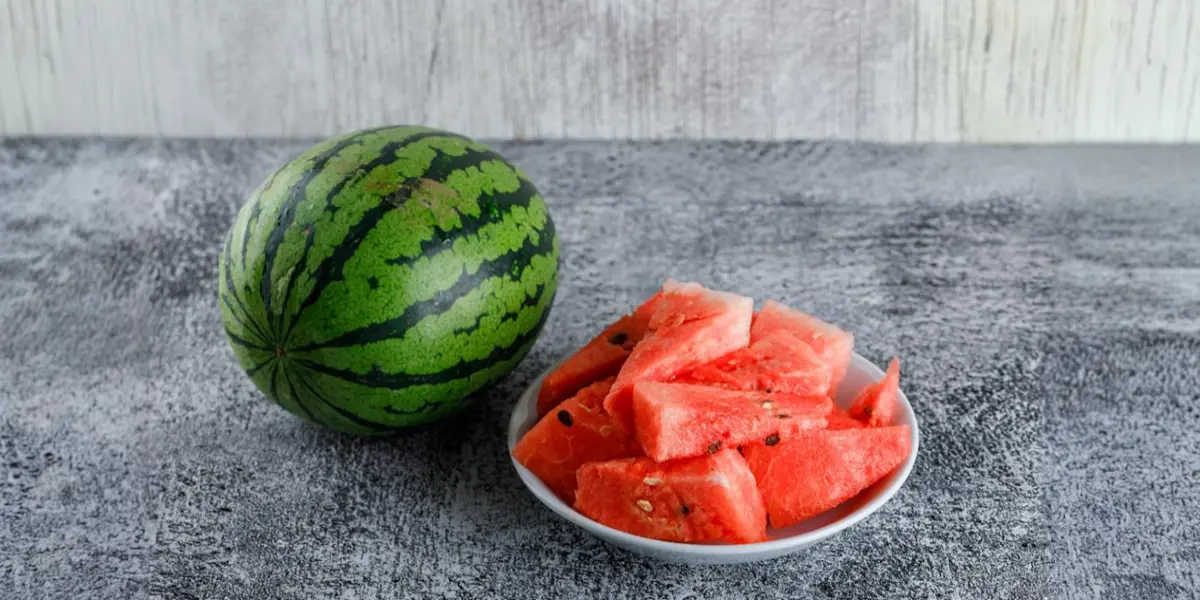Is Watermelon Good For Diabetes?

Watermelon brings back so many childhood memories – whether it was enjoying a big slice on a hot afternoon, picking out the seeds, or having it after school from the roadside vendor. It’s one of the most loved summer fruits, known for its refreshing taste and natural sweetness. But if you have diabetes, you might hesitate before taking a bite, wondering if it’s safe for you.
Since watermelon is naturally sweet, many people worry that it might raise their blood sugar levels. The truth is that watermelon can be a part of a diabetes-friendly diet if eaten in the right portions.
In this blog, we’ll break down whether people with diabetes can eat watermelon, how it affects blood sugar, and the best way to enjoy it without worry.
To know your chances of Diabetes reversal, take the Diabetes Reversal TestDiabetes Reversal
Calculator
What is the Nutritional Value Of Watermelon?
Watermelon is made up of 91% water, making it an excellent way to stay hydrated. It is naturally low in calories, rich in vitamins, minerals, and antioxidants, and provides natural sugars that offer quick energy without added processed sugars.
A 100 grams of small slice of watermelon contains:
| Nutrient | Nutritional Value |
| Calories | 30 kcal |
| Water | 91 g |
| Carbohydrates | 8 g |
| Sugars | 6 g |
| Dietary Fiber | 0 g |
| Protein | 1 g |
| Fat | 0 g |
| Potassium | 112 mg |
How Much Sugar is in Watermelon?
Watermelon contains 6 grams of natural sugar per 100 grams (roughly a small slice). This is less sugar than a banana (~14g per 100g) and mango (~ 8 g per 100 g – Alphonso) but more than strawberries (~4 g per 100g).
Since watermelon is mostly water, the sugar in it is not as concentrated as in processed sweets. This means it doesn’t raise blood sugar as quickly. However, eating too much at once can still affect blood sugar levels, so it’s important to watch your portion size.
| ✅ Tip: If you have diabetes, stick to a serving size of ½ to 1 cup of diced watermelon and pair it with protein or fiber-rich foods (like nuts, curd, or seeds) to slow sugar absorption. |
Is Watermelon Good for Diabetes?
Watermelon has a high glycemic index (GI) of 72, which means its sugars can be absorbed quickly. However, its glycemic load (GL) is only 5 per 120g serving, meaning it doesn’t spike blood sugar drastically when eaten in moderate portions.
👉 What does this mean?
- High GI, Low GL: The sugars break down fast, but because there’s not a lot of sugar content in a typical portion, the overall effect on blood sugar is small.
- Pair it Smartly: Eating watermelon with protein, fiber, or healthy fats (ike nuts and seeds) helps slow down sugar absorption and prevents sharp blood sugar spikes.
So, while watermelon can be included in a diabetes-friendly diet, it should be eaten in small, mindful portions.
What Are the Health Benefits of Watermelon for People with Diabetes?
1. Keeps You Hydrated
Since watermelon is 91% water, it helps keep your body hydrated, which is especially important for people with diabetes, as they may be more prone to dehydration.
2. Rich in Antioxidants
Watermelon contains powerful antioxidants (like lycopene, vitamin C, and beta-carotene) that help reduce inflammation, protect cells, and may lower the risk of diabetes-related complications.
3. Supports Heart Health
Watermelon contains citrulline and potassium, which may help lower blood pressure and improve blood circulation. Since people with diabetes have a higher risk of heart disease, eating watermelon in moderation can be beneficial.
4. Aids Digestion
Watermelon has both fiber and high water content, which can help with digestion and prevent constipation.
5. May Support Insulin Function
Some studies indicate that watermelon contains L-citrulline, which could play a role in how the body processes insulin. However, further research is needed to confirm its effects.
What are the Other Health Benefits of Eating Watermelon?
Watermelon has many health benefits other than being good for blood sugar management:
- Strengthens the Immune System: Rich in vitamin C, which helps the body fight infections.
- Good for Skin & Hair: Vitamin A and C help keep skin healthy and hair strong.
- Supports Eye Health: Contains beta-carotene and lutein, which help maintain good vision.
- May Reduce Muscle Soreness: Citrulline in watermelon may help with muscle recovery after exercise.
- Helps with Weight Management: Watermelon is low in calories and high in water, making it a great snack for those trying to maintain or lose weight.
3 Tips for Incorporating Watermelon into Your Diet
✅ Stick to Small Portions: Eat ½ to 1 cup of diced watermelon at a time.
| Don’t Spit, Eat the Seeds!
We usually spit out watermelon seeds, but did you know they’re actually nutritious? They help slow sugar absorption and are packed with healthy fats, fiber, and protein, which balance the fruit’s natural sugars. You can dry and eat them as a snack – on their own, in a seed mix, or with nuts. Store-bought ones are white because their outer layer is removed during processing. So next time, maybe don’t toss them aside! |
✅ Pair it with Protein or Healthy Fats: Try watermelon with nuts, seeds, or yoghurt/curd for balanced sugar absorption.
✅ Add to Salads: Mix watermelon, cucumber, feta cheese, and mint for a refreshing summer salad.
| Our expert nutritionists at Fitterfly always advise our program members to avoid watermelon juice or any type of fruit juice. When you juice a fruit, the fiber is removed, which makes the sugar enter your bloodstream faster. This can cause a quick rise in blood sugar levels. Instead, we suggest enjoying fresh fruit in controlled portions to get the full benefits of its nutrients and fiber. |
4 Common Myths About Watermelon for People with Diabetes
🚫 Myth #1: Watermelon is Too Sweet for People with Diabetes
✔ Truth: While it contains natural sugar, it can be eaten in moderation without drastically affecting blood sugar.
🚫 Myth #2: Watermelon Causes Instant Blood Sugar Spikes
✔ Truth: It has a high GI but a low glycemic load, meaning its effect on blood sugar is small when eaten in controlled portions.
🚫 Myth #3: Diabetics Should Avoid Watermelon Completely
✔ Truth: Watermelon can be included in a diabetes-friendly diet as long as it’s eaten in small, controlled portions.
🚫 Myth #4: Watermelon Juice is Just as Healthy as Whole Watermelon
✔ Truth: Juice lacks fiber, which helps slow sugar absorption, making whole watermelon the better choice.
What is the Best Time to Eat Watermelon?
The best time to eat watermelon is during the day, preferably in the morning or afternoon. Eating it earlier helps with digestion and provides hydration and energy. Avoid eating it at night, as its high sugar and water content may cause bloating or disturb sleep.
How We At Fitterfly Can Help You?
Eating fruits like watermelon can be tricky when you have diabetes. While it’s packed with nutrients, the sugar content and portion size matter. That’s where Fitterfly can help!
At Fitterfly, our Diabetes Prime Program is designed to guide you on what to eat, how much to eat, and how to balance your meals for better blood sugar control. With the help of your Nutrition Coach, Fitness Coach, and Success Coach, we create a personalized plan that fits your lifestyle and food preferences.
Our expert nutritionists recommend avoiding watermelon juice since it lacks fiber and can cause a quicker rise in blood sugar. Instead, we guide you on how to enjoy fresh watermelon in the right portions and with the right food pairings (like nuts or yoghurt) to slow down sugar absorption.
With the Fitterfly app, you can track your meals, monitor your sugar levels, and get expert advice all in one place. If you want to take charge of your diabetes while still enjoying your favourite foods, we’re here to help.
Give us a missed call at 08068507599, and let’s make diabetes management easier and more enjoyable for you!
Reduced diabetes medications in 3 months


6.8%
Happy members
EMI
Guarantee
4.8/5
Diabetes Prime Program
This blog provides general information for educational and informational purposes only and shouldn't be seen as professional advice.
Frequently Asked Questions
Is Watermelon Good for Prediabetes?
Yes, watermelon can be eaten in moderation if you have prediabetes. While it has natural sugars, it is low in calories and high in water, making it a better choice than processed sweets. However, since it has a high glycemic index (GI), it’s best to eat small portions and pair it with fiber or protein-rich foods (like nuts or yoghurt) to slow sugar absorption.
Is Watermelon Too High in Sugar?
Watermelon contains natural fruit sugar, but it is not as high in sugar as some other fruits. It has 6.2 grams of sugar per 100 grams, which is less than a banana but more than strawberries. Since it is mostly water, its sugar content is diluted, meaning it does not impact blood sugar as quickly as refined sugar or fruit juices.
How Much Watermelon Should a Diabetics Eat?
People with diabetes should limit their watermelon intake to about ½ to 1 cup of diced watermelon at a time. Eating too much can lead to a rise in blood sugar. To prevent sugar spikes, it's best to eat it with a source of protein or fiber, such as nuts, seeds, or curd.
Can Watermelon Raise Your Blood Sugar?
No, it does not when eaten in a controlled portion. While watermelon has a high glycemic index (GI), it has a low glycemic load (GL), meaning it does not cause a significant spike in blood sugar when consumed in moderation.
Can a Diabetic Eat Watermelon at Night?
Eating late at night isn’t ideal, especially for weight loss. But if you’re really hungry, watermelon is a better choice than unhealthy snacks like chips or sweets. However, it still has natural sugars that can affect blood sugar levels while resting. It’s best for people with diabetes to eat watermelon in small portions during the day and avoid it at night.





















